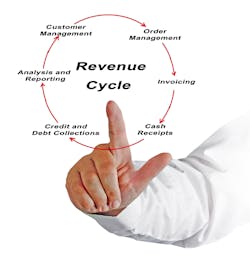The “do it yourself” (DIY) phenomenon may work for home repair and improvement, but it doesn't work anymore for revenue cycle management. The amount of knowledge required and the cost of tools and technology has become so excessive that small and mid-size hospitals and health systems are realizing that building their own revenue cycle management approach is as challenging as setting up their smart house to turn on lights, start the oven and even feed the dogs.
Optimization of financial performance – two options As regulations and requirements increase and the pressure and urgency to optimize financial performance (especially in light of the revenue lost due to the COVID-19 pandemic), the C-suite recognizes RCM can no longer succeed without focused strategic attention and intention. It requires a leader and a staff with revenue cycle as their only focus to help ensure the entity has the sustained financial strength needed as market and payor dynamics continue to evolve rapidly.
Provider organizations have two options. One is to build a staff exclusively focused on RCM. That means hiring people, training them, paying salary and benefits, finding space for them, giving them the proper equipment and technology, etc. at a time when many hospitals and health systems are already struggling to remain financially viable. Since 2010, 120 rural hospitals have closed, and 453 more are considered vulnerable to closing.
The second option is to acquire these capabilities by working with a managed services partner that already has proven expertise, processes, trained personnel, technology, and best practices, etc. in RCM. In 2018, nearly 80% of U.S. hospitals said they were considering outsourcing RCM, leading to predictions that RCM managed services will become a $23 billion industry by 2023.
Partnership has its advantages
Deciding to partner with an RCM service provider has its advantages and concerns. Among the pros are:
· It enables the provider organization to focus on its primary purpose. Moving RCM to a managed services partner enables the organization – clinicians – to focus on patient care while experts in coding, billing, claims, and collections can focus on these functions.
· It ensures RCM remains current on regulatory compliance. The compliance landscape was already shifting rapidly and continuously before COVID-19. It is changing faster than ever, with some pandemic-related regulations, and reporting is temporary, while others are poised to become permanent. If there is a conflict between keeping up with changes to reimbursement regulations and clinical knowledge, clinicians may very well prioritize the latter. A managed services RCM provider doesn't face that conflict.
· Maximizes reimbursement and cash flow. Each health plan has specific rules and documentation requirements for processing claims, denial management, and reimbursement. An RCM managed services provider can help the organization ensure claims are submitted the way each payor wants them, within their rules, to prevent/reduce denials and improve cashflow. A strong RCM partner will also have processes, procedures, and mechanisms to maximize the collection of the patient portions of claims, an increasingly large percentage of overall revenue. If necessary, the RCM managed services provider can help a healthcare organization set up payment plans for patients, answer billing questions, and manage other tasks to relieve the internal staff.
· Keeps your RCM operation up to date. A great RCM managed services provider will understand all collection issues, accounts receivable, denials, coding, clinical documentation improvement, and claims processing. It will improve efficiencies in these areas by hiring the right staff, training, and educating them, and giving them the most current and appropriate technology. It will also update systems and procedures to improve and automate processes wherever possible, increasing efficiency and throughput while eliminating the avoidable errors inherent in manual data entry. It will also share downstream process improvement opportunities with the client to help overall operations and revenue cycle.
· Improves patient experience. Taking a holistic, professional approach to RCM through a managed services partner helps ensure the patient experience regarding their bill and payment is as positive as possible. The last part of a medical encounter – be it a hospital stay or an outpatient procedure – will be their bill. Errors or poor customer service will significantly impact patients' overall impression of the healthcare organization and the rankings, ratings, and social media posts that result from it.
Giving up full control
One constraint in partnering for RCM managed services is that the organization releases control of the process. Ultimately, it's about trust. It's like leaving a child with a babysitter for the first time. The healthcare organization must feel confident that the RCM managed services partner will care for their revenue cycle as strongly as the organization does. For hospitals viewed as a major employer in the region, there are also valid concerns that working with an RCM partner might take jobs out of the community. This becomes less of a concern when RCM managers employed directly by the hospital become the RCM company's employees.
Just like the DIY project, the days of internally building and managing RCM are mainly fading. By partnering with an RCM managed services provider, healthcare organizations can maximize revenue and cash flow while operating more efficiently, delivering a better patient experience – and remaining laser-focused on their core mission.
Keith Olenik is VP of Practice Management at Pivot Point Consulting, a healthcare IT consulting leader providing implementation, optimization, project management, legacy support and strategic advisory services nationwide.



